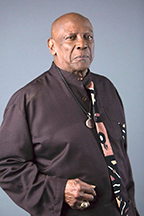By Ericka Alston Buck
(Source Special to The AFRO):
The world is mourning the loss of a legendary actor whose talent and charisma graced both the big and small screens for decades. Louis Gossett Jr., an icon of stage and screen, died March 29 at the age of 87, leaving behind a legacy that forever will be cherished by fans and peers alike.
Sign up for our Daily eBlast to get coverage on Black communities from the media company who has been doing it right for over 130 years.
Gossett’s journey in the entertainment industry was nothing short of remarkable.
Born in Brooklyn, New York, on May 27, 1936, he discovered his passion for acting at a young age and pursued it with unwavering determination. His early years were marked by perseverance and hard work, as he honed his craft on stage and screen, steadily carving a name for himself in an industry that often presented formidable challenges.
In 1953, Gossett made his Broadway debut at the age of 16 after his English teacher encouraged him to try out for “Take a Giant Step.”
“I knew too little to be nervous,” Gossett wrote in his memoir. “In retrospect, I should have been scared to death as I walked onto that stage, but I wasn’t.”
In 1959, he appeared in the acclaimed play “A Raisin in the Sun,” portraying George Murchison alongside a stellar cast led by Sidney Poitier. His performance earned him critical acclaim and set the stage for a prolific career that would span over six decades.
He reprised that role in 1961 in the Hollywood version of the play, marking his first appearance in the silver screen.
Throughout his illustrious career, Gossett distinguished himself as a versatile actor capable of embodying a wide range of roles with depth and authenticity. From powerful dramas to lighthearted comedies, he captivated audiences with his commanding presence and magnetic charisma. Whether playing a tough drill sergeant in “An Officer and a Gentleman” or a compassionate mentor in “Roots,” Gossett brought a level of nuance and gravitas to his performances that left an indelible mark on the hearts and minds of viewers.
One of Gossett’s most iconic roles came in 1982 when he portrayed Gunnery Sergeant Emil Foley in “An Officer and a Gentleman,” opposite Richard Gere. His portrayal of the no-nonsense drill instructor earned him widespread acclaim and garnered him the Academy Award for Best Supporting Actor, making him the first African American male to win in that category.
Beyond his impressive body of work on screen, Gossett was also a trailblazer for diversity and inclusion in Hollywood. Throughout his career, he advocated for greater representation of people of color in the entertainment industry, using his platform to amplify marginalized voices and push for meaningful change. His efforts paved the way for future generations of actors and filmmakers, inspiring them to pursue their dreams and break down barriers in an industry often resistant to change.
As news of Gossett’s death spreads, tributes pour in from fans, colleagues and admirers around the world, each one reflecting on the profound impact he had on their lives and the industry as a whole. For many, Gossett was more than just an actor; he was a beacon of hope and inspiration, a symbol of resilience and perseverance in the face of adversity.
His legacy will endure through the countless lives he touched and the timeless performances he delivered. From his groundbreaking work in “Roots” to his unforgettable turn in “Iron Eagle,” Gossett’s influence reverberates far beyond the confines of the silver screen, reminding us of the power of storytelling to unite, inspire, and uplift.
“He was a remarkable actor and professional. He showed up to set and to life with generosity and great wisdom regarding entertainment,” said Baltimore entertainer Rain Pryor, an American actress. Her television credits include sitcoms “Head of the Class” and “Rude Awakening.” She is the daughter of comedian legend Richard Pryor.
“The man was an amazing actor very professional on and off set,” said fan Doug Magoch. “Every movie I have seen of his, the depth of his acting made you believe his characters. He, in my eyes, is in a class of his own. He will surely be missed.”
CORRECTION: A previous version of this story was changed to correct Gossett’s age and the year and play in which he made his Broadway debut among other editorial revisions.

